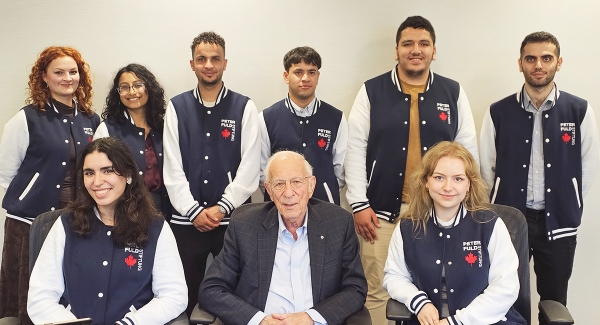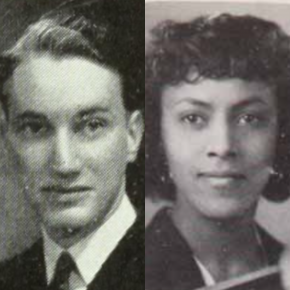
Scholars of the Peter Fuld Foundation undertook an educational trip to Canada, following in the footsteps of the foundation’s founder, University of Toronto alumnus Peter H. Fuld. The purpose of their visit was to meet with organizations and leaders on the themes of strategies for better integration; multiculturalism and a sense of belonging; and confronting racism.
They visited the University of Toronto Faculty of Law on Sept. 24 and met with U of T recipients of the Ivy Maynier Bursary and University Professor and Dean Emeritus Martin L. Friedland (LLB 1958).

Peter H. Fuld (Torontonensis, the yearbook of the University of Toronto, 1945) and Ivy Lawrence (McGill University yearbook, 1942).
For decades, the Peter Fuld Foundation, based in Frankfurt, Germany, has stood against discrimination and fought for greater equality in education by providing scholarships for students from marginalized backgrounds.
The foundation’s vision reflects the values of its benefactor, University of Toronto alumnus Peter H. Fuld (BA 1945 VIC, LLB 1946) and honours his life-long friendship with his classmate, Ivy Lawrence Maynier (LLB 1945), the first Black Canadian woman to graduate from U of T’s then law school.
As Martin L. Friedland, university professor and dean emeritus of U of T’s Faculty of Law writes of their friendship in his biography of U of T’s first law school dean, W.P.M. Kennedy:
“An ‘enemy alien’ who studied at [U of T’s] School of Law...combined with the story of a West Indies student…could be the subject of a movie or television series.”
Born in 1921 to a Jewish father and a German mother, Fuld’s father, Harry Fuld, was the founder of Germany’s first telecommunications service provider, H. Fuld & Co.
Fuld was only 11 years old when his father died. When the Nazi regime came to power, Fuld’s mother feared for her son’s safety, as the son of a Jewish father. At age 18, his mother sent him first to Switzerland and then to London, England, to attend school.
But during the war, England was not a refuge as a German national. He was classified as a foreign ‘alien’ by the British and sent to Canada’s internment camps.
“I had been playing tennis that day, and the authorities were waiting for me when I came home. They didn't even allow me to pack a suitcase. I was placed aboard a ship and had to travel all the way to Canada in my tennis shorts. There were no beds for some of us, so I slept on a table during the voyage. It is something I'll never forget,” Fold is quoted as retelling friends, as reported in a 1968 issue of Ebony magazine.
The Birks family – master silversmiths from Sheffield, England who had emigrated to Canada – assisted Fuld in securing his release from internment. As a Jewish refugee, he was eligible to enrol at a Canadian university and was accepted to U of T.
Born in Montreal to Trinidadian parents, Ivy Lawrence, knew, from an early age, that education would be her pathway to making a positive impact. While an undergraduate at McGill University, she was named president of the Women’s Debating Union and was the first woman to receive its Debating Key. She was awarded a scholarship which allowed her to study law at U of T.
As German living in Canada during the war, Fuld was an outsider. He didn’t practise his father’s faith and was rebuked for his Jewish refugee status, which helped free him from internment.
But on Fuld’s first day of law school, it was Lawrence — another outsider, breaking down barriers by pursuing a law degree — who was seated next to him. Their aligned interests in law, politics and art quickly bonded the pair. A “campus couple” as they soon became known.
After Fuld obtained Canadian citizenship and after both Fuld and Lawrence graduated with their U of T law degrees, the couple returned to London. Fuld hired a lawyer, Philip H. Hartely, and reclaimed his family’s growing telecommunication business, now Telefonbau and Normalzeit Lehner & Co. Lawrence was called to the Bar in England in 1947.
But Fuld’s mother, Frau lda Fuld, fought vehemently against her son’s intention to marry Lawrence. The couple eventually parted ways. Lawrence practised law in Trinidad, worked for the U.S. information Service in Paris and later found a new passion in adult education, working as an administrator at the University of West Indies in Jamaica.
Fuld and Lawrence remained friends. Lawrence married Earle Anthony Maynier, a West Indies Federal Government official, in 1961. Maynier himself would often visit Fuld on trips to Europe.
At age 41, Fuld died tragically of brain cancer. His estate established the Peter Fuld Foundation, a non-profit proving education and training for talented young people who have suffered discrimination. Lawrence Maynier was one of three persons named to the foundation’s first advisory board.
Fuld also made bequests to those most important in his life, including Lawrence Maynier. Among his wishes for her use of the gift, was to establish legal education in the West Indies.
When Lawrence Maynier died in 1999, she bestowed $600,000 to U of T’s Faculty of Law. At the time, the gift was matched by the university to endow the Ivy Maynier Bursary. Each year, the bursary is awarded to JD students who demonstrate financial need and are a member of an under-represented minority group. Dozens of students have benefited from this financial assistance in the 25 years since the bursary was established.
In Germany and here, in Canada, at U of T’s Faculty of Law, Fuld and Lawrence Maynier’s shared passion for education and law continues to defy barriers of discrimination.
With files from Charles L. Sanders, "The Legacy of a Love Affair". Ebony (March 1968); Randi Chapnik Myers, "Ivy Maynier Bursary". Nexus (Fall/Winter 2004); Martin L. Friedland, Searching for W.P.M. Kennedy: The Biography of an Enigma (UTP 2020); Peter Fuld Foundation; McGill University yearbook (1942); and Torontonensis, the yearbook of the University of Toronto (1945).


